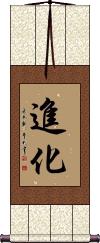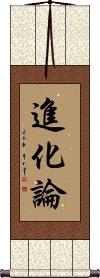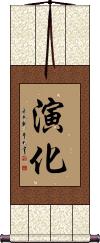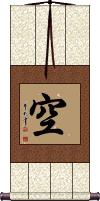Many custom options...
And formats...

Evolution in Chinese / Japanese...
Buy an Evolution calligraphy wall scroll here!
Personalize your custom “Evolution” project by clicking the button next to your favorite “Evolution” title below...
Evolution
進化 means evolution in Chinese, Japanese Kanji, and old Korean Hanja.
Sometimes it can mean progress, and in Japanese, it can be the female given name, Shinka.
Theory of Evolution
進化論 can be translated as “Darwin's theory of evolution,” “evolutionary theory,” or “theory of evolution.”
Same translation for Chinese, Japanese, and old Korean. Therefore, this title is very universal.
Evolve / Evolution
Sky / Ether / Void / Emptiness / Unreality
(Used in Japanese version of five elements)
空 is a single character that means empty, void, hollow, vacant, vacuum, blank, nonexistent, vacuity, voidness, emptiness, non-existence, immateriality, unreality, the false or illusory nature of all existence, and being unreal.
In the Buddhist context, this relates to the doctrine that all phenomena and the ego have no reality but are composed of a certain number of skandhas or elements, which disintegrate. The void, the sky, space. The universal, the absolute, complete abstraction without relativity. The doctrine further explains that all things are compounds, or unstable organisms, possessing no self-essence, i.e. are dependent, or caused, come into existence only to perish. The underlying reality, the principle of eternal relativity, or non-infinity, i.e. śūnya, permeates all phenomena making possible their evolution.
From Sanskrit and/or Pali, this is the translation to Chinese and Japanese of the title śūnya or śūnyatā.
In Japanese, when pronounced as “ron” (sounds like “roan”) this can be a given name. It should be noted that this Kanji has about 5 different possible pronunciations in Japanese: kuu, kara, sora, ron, and uro. 空 is also an element in the Japanese version of the five elements.
This in-stock artwork might be what you are looking for, and ships right away...
Gallery Price: $31.00
Your Price: $16.88
Not the results for evolution that you were looking for?
Below are some entries from our dictionary that may match your evolution search...
| Characters If shown, 2nd row is Simp. Chinese |
Pronunciation Romanization |
Simple Dictionary Definition |
空 see styles |
kòng kong4 k`ung kung kuu / ku くう |
More info & calligraphy: Sky / Ether / Void / Emptiness / Unreality(1) empty air; sky; (2) {Buddh} shunyata (the lack of an immutable intrinsic nature within any phenomenon); emptiness; (3) (abbreviation) (See 空軍) air force; (noun or adjectival noun) (4) fruitlessness; meaninglessness; (noun or adjectival noun) (5) (See 五大・1) void (one of the five elements); (can be adjective with の) (6) {math} empty (e.g. set); (female given name) Ron śūnya, empty, void, hollow, vacant, nonexistent. śūnyatā, 舜若多, vacuity, voidness, emptiness, non-existence, immateriality, perhaps spirituality, unreality, the false or illusory nature of all existence, the seeming 假 being unreal. The doctrine that all phenomena and the ego have no reality, but are composed of a certain number of skandhas or elements, which disintegrate. The void, the sky, space. The universal, the absolute, complete abstraction without relativity. There are classifications into 2, 3, 4, 6, 7, 11, 13, 16, and 18 categories. The doctrine is that all things are compounds, or unstable organisms, possessing no self-essence, i.e. are dependent, or caused, come into existence only to perish. The underlying reality, the principle of eternal relativity, or non-infinity, i.e. śūnya, permeates all phenomena making possible their evolution. From this doctrine the Yogācārya school developed the idea of the permanent reality, which is Essence of Mind, the unknowable noumenon behind all phenomena, the entity void of ideas and phenomena, neither matter nor mind, but the root of both. |
演化 see styles |
yǎn huà yan3 hua4 yen hua |
More info & calligraphy: Evolve / Evolution |
進化 进化 see styles |
jìn huà jin4 hua4 chin hua shinka しんか |
More info & calligraphy: Evolution(n,vs,vi) (1) {biol} evolution; (n,vs,vi) (2) (ant: 退化・2) evolution; becoming more advanced; progress; development; improvement; (female given name) Shinka |
進化論 进化论 see styles |
jìn huà lùn jin4 hua4 lun4 chin hua lun shinkaron しんかろん |
More info & calligraphy: Theory of Evolutionevolutionary theory; theory of evolution |
論 论 see styles |
lùn lun4 lun ron ろん |
opinion; view; theory; doctrine; to discuss; to talk about; to regard; to consider; per; by the (kilometer, hour etc) (n,n-suf) (1) argument; discussion; dispute; controversy; discourse; debate; (n,n-suf) (2) theory (e.g. of evolution); doctrine; (n,n-suf) (3) essay; treatise; comment; (surname) Ron To discourse upon, discuss, reason over; tr. for śāstra, abhidharma, and upadeśa, i.e. discourses, discussions, or treatises on dogma, philosophy, discipline, etc. |
化育 see styles |
kaiku かいく |
(noun, transitive verb) creation of the world; evolution |
天演 see styles |
tiān yǎn tian1 yan3 t`ien yen tien yen |
natural change; evolution (early translation, since replaced by 進化|进化) |
展開 展开 see styles |
zhǎn kāi zhan3 kai1 chan k`ai chan kai tenkai てんかい |
to unfold; to spread out; to open up; to launch; to carry out (n,vs,vt,vi) (1) development; evolution; progression; unfolding; (plot) twist; (n,vs,vt,vi) (2) expansion; spreading out; extending; deployment; building up; (n,vs,vt,vi) (3) {math} expansion (of an algebraic expression); (n,vs,vt,vi) (4) {math} development (of a three-dimensional shape); (n,vs,vt,vi) (5) {comp} extraction (of compressed data); decompression; unpacking; (noun, transitive verb) (6) {bus} sharing (information) |
沿革 see styles |
yán gé yan2 ge2 yen ko enkaku えんかく |
evolution of something over time; course of development; history history; development |
演進 演进 see styles |
yǎn jìn yan3 jin4 yen chin |
evolution; gradual forward progress |
轉識 转识 see styles |
zhuǎn shì zhuan3 shi4 chuan shih tenjiki |
(1) pravṛtti-vijñāna; knowledge or mind being stirred, the external world enters into consciousness, the second of the five processes of mental evolution in the 起信論. (2) The seven stages of knowledge (vijñāna), other than the ālaya-vijñāna, of the 唯識論. (3) Knowledge which transmutes the common knowledge of this transmigration-world into buddha-knowledge. |
開方 开方 see styles |
kāi fāng kai1 fang1 k`ai fang kai fang kaihou / kaiho かいほう |
(medicine) to write out a prescription; (math.) to extract a root from a given quantity (mathematics term) extraction of roots; evolution |
開法 开法 see styles |
kāi fǎ kai1 fa3 k`ai fa kai fa kaihō かいほう |
(mathematics term) extraction of roots; evolution To found a sect or teaching, e.g. as Buddha founded Buddhism; the method of opening, or beginning. |
LTE see styles |
eru tii ii; erutiiii(sk) / eru ti i; erutii(sk) エル・ティー・イー; エルティーイー(sk) |
{comp} Long Term Evolution (wireless communication standard); LTE |
中立説 see styles |
chuuritsusetsu / churitsusetsu ちゅうりつせつ |
neutral theory (of molecular evolution) |
天演論 天演论 see styles |
tiān yǎn lùn tian1 yan3 lun4 t`ien yen lun tien yen lun |
the theory of evolution (early translation, since replaced by 進化論|进化论) |
衞世師 衞世师 see styles |
wèi shì shī wei4 shi4 shi1 wei shih shih Eiseishi |
Vaiśeṣika; derived from viśeṣa, characteristic, individuality, particularity or individual essence. M.W. Also 鞞世師 (or 鞞思迦); 吠世史迦; 勝論宗 An atomistic school founded by Kaṇāda. Like the Saṅkhya philosophy it taught a dualism and an endless number of souls, also by its doctrine of particularity or individual essence maintained 'the eternally distinct or sui generis nature of the nine substances' (see below), 'of which the first five including mind are held to be atomic.' M.W. The interaction of these with the six mentioned below produces cosmic evolution. It chiefly occupied itself, like the orthodox Nyāya philosophy, with the theory of knowledge, but it differed by distinguishing only six categories of cognition 六諦, viz. substance, quality, activity, species, distinction, and correlation, also a seventh of non-existence, and nine substances possessed of qualities, these 九陰 being: the five elements, air, fire, water, earth, ether, together with time, space, spirit (manas), and soul (ātman). Cf. Keith, Indian Logic and Atomism, and Dasgupta, History of Indian Philosophy. |
轉識論 转识论 see styles |
zhuǎn shì lùn zhuan3 shi4 lun4 chuan shih lun Tenshiki ron |
Evolution of Consciousness |
適存度 适存度 see styles |
shì cún dù shi4 cun2 du4 shih ts`un tu shih tsun tu |
fitness (evolution); ability to survive and reproduce |
ウイイレ see styles |
uiire / uire ウイイレ |
(work) Winning Eleven (video game series) (abbreviation); Pro Evolution Soccer; (wk) Winning Eleven (video game series) (abbreviation); Pro Evolution Soccer |
分子進化 see styles |
bunshishinka ぶんししんか |
(noun/participle) molecular evolution |
化学進化 see styles |
kagakushinka かがくしんか |
(noun/participle) chemical evolution |
収斂進化 see styles |
shuurenshinka / shurenshinka しゅうれんしんか |
{biol} convergent evolution |
収束進化 see styles |
shuusokushinka / shusokushinka しゅうそくしんか |
{biol} (See 収斂進化) convergent evolution |
和平演変 see styles |
waheienpen / waheenpen わへいえんぺん |
(Chinese translation of "peaceful evolution") peaceful overthrow of Chinese communism (alleged Western strategy) |
唯識中道 唯识中道 see styles |
wéi shì zhōng dào wei2 shi4 zhong1 dao4 wei shih chung tao yuishiki chūdō |
The madhya, or medial doctrine of idealism as held by the 法相 Dharmalakṣana school, that all things are of mind, evolution, and are neither in themselves real nor unreal. |
平行進化 see styles |
heikoushinka / hekoshinka へいこうしんか |
(noun/participle) parallel evolution |
旋陀羅尼 旋陀罗尼 see styles |
xuán tuó luó ní xuan2 tuo2 luo2 ni2 hsüan t`o lo ni hsüan to lo ni sen darani |
A spell which endows with extensive powers of evolution; also varied involutions of magical terms. |
時間発展 see styles |
jikanhatten じかんはってん |
{physics} time evolution; temporal development |
社会進化 see styles |
shakaishinka しゃかいしんか |
(noun/participle) social evolution |
Click here for more evolution results from our dictionary
The following table may be helpful for those studying Chinese or Japanese...
| Title | Characters | Romaji (Romanized Japanese) | Various forms of Romanized Chinese | |
| Evolution | 進化 进化 | shinka | jìn huà / jin4 hua4 / jin hua / jinhua | chin hua / chinhua |
| Theory of Evolution | 進化論 进化论 | shinkaron | jìn huà lùn jin4 hua4 lun4 jin hua lun jinhualun | chin hua lun chinhualun |
| Evolve Evolution | 演化 | yǎn huà / yan3 hua4 / yan hua / yanhua | yen hua / yenhua | |
| Sky Ether Void Emptiness Unreality | 空 | kuu / kara / sora / ron ku / kara / sora / ron | kōng / kong1 / kong | k`ung / kung |
| In some entries above you will see that characters have different versions above and below a line. In these cases, the characters above the line are Traditional Chinese, while the ones below are Simplified Chinese. | ||||
Successful Chinese Character and Japanese Kanji calligraphy searches within the last few hours...








